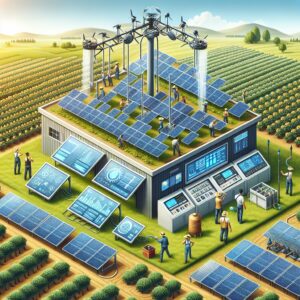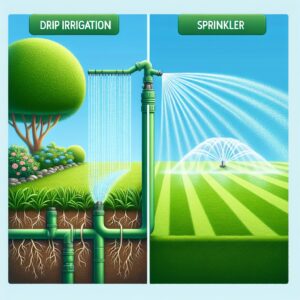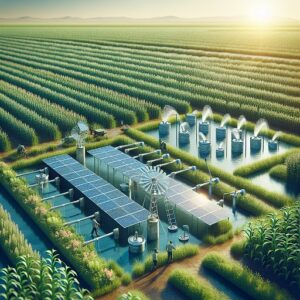
Key Takeaways
-
Lithium-ion batteries offer high energy efficiency and storage capacity, making them ideal for solar irrigation systems.
-
Understanding your farm’s energy requirements is crucial to selecting the right lithium-ion battery capacity.
-
While lithium-ion batteries have a higher upfront cost, their longevity and low maintenance can lead to cost savings over time.
-
Temperature management and proper charging practices are key to maintaining lithium-ion battery health.
-
Grants and tax credits may be available to help offset the initial investment in solar battery technology for agriculture.
Harnessing the Sun: Optimal Battery Technology for Your Solar Irrigation Needs
When you’re looking to keep your crops thriving, the sun does more than just provide light; it’s a powerhouse of energy waiting to be tapped. Solar irrigation systems are revolutionizing the way we think about farming, and at the heart of this transformation is the lithium-ion battery. But why lithium-ion, you ask? Let’s dive into the reasons that make these batteries the best choice for farmers looking to harness solar power for irrigation.
Why Lithium-Ion Stands Out in Solar Applications
Imagine a battery that charges quickly, lasts longer, and takes up less space. That’s what lithium-ion technology brings to the table. These batteries have a higher energy density, which means they can store more energy in a smaller footprint. This is a game-changer for farms where space and efficiency are at a premium.
Most importantly, lithium-ion batteries have a lower rate of self-discharge. This means that the energy they store won’t go to waste, making them a reliable partner for solar-powered systems. And because they can handle hundreds, even thousands of charge-discharge cycles, they’re built to last, ensuring that your investment pays off in the long run.
Lithium-Ion Batteries and Solar Irrigation: A Perfect Match
Now, let’s talk specifics. Why are lithium-ion batteries a match made in heaven for solar irrigation systems? First, they’re adept at storing the intermittent energy that solar panels capture throughout the day. This stored power can then be used to run irrigation systems whenever it’s needed, be it day or night, rain or shine.
Furthermore, lithium-ion batteries can handle the fluctuations that come with solar energy generation. They’re robust enough to manage the highs and lows without compromising on performance. This means a more consistent water supply for your crops, leading to better growth and higher yields.

Lithium-Ion Batteries: The Heart of Eco-Conscious Farming
As we move towards a greener future, lithium-ion batteries stand out as the eco-friendly choice. They don’t just store energy; they do it without harmful emissions. This aligns perfectly with the principles of sustainable farming, where every effort is made to minimize the carbon footprint.
The Basics of Lithium-Ion for Green Thumbs
If you’re new to the world of solar irrigation, you might wonder what makes lithium-ion batteries tick. In simple terms, they work by moving lithium ions between the anode and cathode. This movement generates the power needed to run your irrigation pumps, and when the sun’s out, the solar panels recharge the battery, readying it for the next cycle.
Understanding Your Farm’s Energy Needs
Before you invest in a lithium-ion battery system, it’s crucial to know how much energy your irrigation system requires. Start by calculating the power used by your pumps and the duration they run each day. This will give you a clear picture of the battery capacity needed to keep your irrigation system running smoothly.
Remember, it’s not just about capacity; it’s about matching your energy needs with the right battery. And that’s where lithium-ion batteries shine. They come in various sizes and configurations, so you can find the perfect fit for your farm’s unique demands.
Choosing the right lithium-ion battery for your solar irrigation system is not just about the immediate benefits. It’s about looking ahead and ensuring that your farm remains productive and sustainable for years to come. Therefore, considering the battery’s capacity and lifecycle is as important as the crop you cultivate.
Capacity and Lifecycle: Key Factors in Selection
Capacity refers to the amount of energy a battery can store. It’s like a water tank for electricity – the bigger the capacity, the more power you can store. To determine the capacity you need, calculate the total energy your irrigation system uses in a day and match it with a battery that can provide that, plus a little extra for peace of mind.
Lifecycle, on the other hand, is about how many times a battery can be charged and discharged before it starts losing its mojo. With lithium-ion batteries, you’re looking at thousands of cycles, which translates to several years of dependable service. This long-term reliability can lead to significant cost savings over time, as you won’t need to replace your batteries as frequently as with other types.
Cost-Effectiveness Over Time: A Financial Overview
Let’s talk numbers. Lithium-ion batteries might seem pricey at first glance, but they’re an investment that pays off. Their extended lifespan means fewer replacements, and their efficiency ensures maximum use of every ray of sunlight captured. In the long run, the cost per cycle of a lithium-ion battery can be lower than that of less advanced battery types.
Think of it this way: you might pay more upfront, but these batteries work harder and last longer, saving you money on replacements and maintenance. It’s like buying a pair of sturdy boots that last for years, rather than opting for a cheap pair that needs replacing every season.
Advantages and Risks For Using Lithium-Ion Batteries with Solar Irrigation System
lithium-ion batteries offer many advantages for a solar irrigation system, such as high energy density, long lifespan, and high efficiency. However, it is important to also consider the potential risks and costs associated with this technology. Proper handling, storage, and disposal are crucial for ensuring the safe and effective use of lithium-ion batteries for your solar irrigation system. Carefully weighing the pros and cons and considering your specific needs and budget will help you make an informed decision on whether lithium-ion batteries are the right choice for your solar irrigation system.
Advantages For Using Lithium-Ion Batteries to Store Power for a Solar Irrigation System
The advantages of using lithium-ion batteries to store power for a solar irrigation system are numerous. They offer high energy density, longer lifespan, fast charging capabilities, low self-discharge rate, environmental friendliness, and durability. These features make them a practical and efficient choice for powering a solar irrigation system, ultimately contributing to sustainable and efficient agricultural practices. This table below will show Advantages For using lithium-ion batteries to store power for a solar irrigation system:
|
Advantages of Using Lithium-Ion Batteries with Solar Irrigation System |
|---|
|
1. High Energy Density: Lithium-ion batteries offer a high energy density, allowing them to store a significant amount of energy in a compact size. This is advantageous for solar irrigation systems where space may be limited. |
|
2. Longer Lifespan: Lithium-ion batteries generally have a longer lifespan compared to other types of batteries used in solar systems, such as lead-acid batteries. This reduces the frequency of battery replacements, resulting in lower maintenance costs over time. |
|
3. Fast Charging: Lithium-ion batteries can be charged quickly, which is beneficial for solar irrigation systems where intermittent sunlight may necessitate rapid charging during periods of sunlight. |
|
4. Efficiency: Lithium-ion batteries are highly efficient, with low self-discharge rates, meaning they can retain stored energy for longer periods without significant loss. This is advantageous for maintaining continuous operation of the irrigation system, even during periods of low sunlight. |
|
5. Lightweight: Lithium-ion batteries are lightweight compared to other battery chemistries, making them easier to transport and install, particularly in remote or off-grid locations where solar irrigation systems are often deployed. |
|
6. Scalability: Lithium-ion batteries can be easily scaled to meet the energy storage requirements of different-sized solar irrigation systems. This scalability allows for flexibility in system design and expansion as needed. |
|
7. Environmentally Friendly: Lithium-ion batteries are considered more environmentally friendly than traditional lead-acid batteries due to their lower toxicity and recyclability. This aligns with the sustainability goals of many solar irrigation projects. |
|
8. Maintenance-Free Operation: Lithium-ion batteries require minimal maintenance compared to other types of batteries, reducing the time and effort needed for upkeep. This is particularly beneficial in remote or inaccessible locations where regular maintenance may be challenging. |
There are also Some Disadvantages for Using Lithium-Ion Batteries with a Solar Irrigation System
While lithium-ion batteries are a fantastic choice, they’re not without their challenges. For one, they require careful temperature management to prevent overheating. They also tend to be more expensive upfront than other types of batteries, which can be a barrier for some farmers.
However, the advantages far outweigh these challenges, especially when you consider the long-term benefits and efficiency gains. With proper care and management, lithium-ion batteries can be a cornerstone of a sustainable and profitable farming operation.

Overcoming Challenges: What You Need to Know
So, you’ve decided that lithium-ion batteries are the way to go for your solar irrigation system. Great choice! But as with any technology, there are challenges to be aware of. The good news is, with the right knowledge, these challenges can be managed effectively.
Dealing with Temperature Extremes and Load Fluctuations
Lithium-ion batteries don’t like getting too hot or too cold. Extreme temperatures can affect their performance and lifespan. To keep them running smoothly, it’s important to install them in a location that’s shielded from direct sunlight and extreme cold.
-
Use insulated enclosures to protect batteries from temperature extremes.
-
Ensure good ventilation to help dissipate heat during charging and discharging.
-
Consider a battery management system to monitor temperature and adjust the load accordingly.
Besides that, solar energy can be inconsistent. Cloudy days or sudden shadows can cause power output to dip. Lithium-ion batteries are well-equipped to handle these fluctuations, ensuring that your irrigation system receives a steady supply of power.
Long-Term Storage Solutions: Keeping Batteries Healthy
Maintaining the health of your lithium-ion batteries is key to ensuring they last as long as possible. This involves regular checks, proper charging practices, and avoiding deep discharges. Here are some tips to keep your batteries in top condition:
-
Regularly clean the battery terminals and check for any signs of corrosion or damage.
-
Use a smart charger that prevents overcharging and deep discharging.
-
Keep an eye on the battery’s state of charge and avoid letting it drop too low.
Remember, a well-maintained lithium-ion battery is not just an asset for your irrigation system; it’s a long-term ally for your farm’s sustainability goals.

Eco-Conscious Farming in Action: Real-World Success Stories
Across the globe, farmers are turning to solar irrigation systems backed by lithium-ion batteries to power their operations. These success stories are not just inspiring; they’re proof of the positive impact that sustainable technology can have on the agricultural industry.
Irrigation on Sunshine: Case Studies of Farms Going Green
Take the story of a vineyard in California that switched to solar irrigation. By using lithium-ion batteries, they were able to reduce their reliance on the grid and cut down their water usage by nearly 30%. This not only saved them money but also conserved precious resources in a state often plagued by drought.
Maximizing Harvests with Minimized Carbon Footprints
Another example is a farm in Kenya that installed a solar irrigation system to water their vegetable crops. The result? A dramatic increase in yield and a reduction in carbon emissions, as they no longer needed to use diesel-powered pumps. Stories like these show that with the right approach, farming can be both productive and planet-friendly.

Navigating Financial Incentives and Subsidies
Investing in lithium-ion battery technology for your solar irrigation system is not just good for the planet; it can also be good for your wallet. Many governments and organizations offer financial incentives to encourage the adoption of renewable energy technologies.
Accessing Grants and Tax Credits for Green Investments
Depending on where you are, you might find grants, low-interest loans, or tax credits available for the installation of solar batteries. These can significantly reduce the upfront cost and improve the return on investment for your sustainable farming technology.
For instance, the U.S. federal government offers a tax credit for solar energy systems, including the batteries that store their energy. This credit can cover a significant portion of the installation costs, making the switch to solar more affordable.
Example: The Investment Tax Credit (ITC) allows you to deduct 26% of the cost of installing a solar energy system from your federal taxes. This applies to both residential and commercial systems, and there is no cap on its value.
This below table will outlining the financial incentives and subsidies associated with using lithium-ion batteries in solar irrigation systems:
|
Financial Incentives and Subsidies for Lithium-Ion Batteries in Solar Irrigation Systems |
|---|
|
1. Government Grants: Many governments offer grants or funding programs to encourage the adoption of renewable energy technologies, including solar irrigation systems with lithium-ion batteries. These grants can help offset the upfront costs of purchasing and installing the system. |
|
2. Tax Credits: Some jurisdictions provide tax credits or rebates for investments in renewable energy systems. These credits can reduce the tax liability of individuals or businesses that install solar irrigation systems with lithium-ion batteries, making the investment more financially attractive. |
|
3. Feed-In Tariffs (FITs): In regions where feed-in tariffs are implemented, solar irrigation system owners can receive payments for the excess electricity generated by their systems and fed back into the grid. This additional income stream can help offset the costs of battery storage, including lithium-ion batteries. |
|
4. Subsidies for Battery Storage: Certain governments or utility companies offer subsidies specifically for battery storage systems, including lithium-ion batteries. These subsidies aim to incentivize the deployment of energy storage technologies to enhance grid stability and support renewable energy integration. |
|
5. Low-Interest Loans: Financial institutions may provide low-interest loans or financing options for the purchase and installation of solar irrigation systems with lithium-ion batteries. These loans can help spread out the upfront costs over time, making the investment more affordable for system owners. |
|
6. Renewable Energy Certificates (RECs): In regions with renewable energy certificate programs, solar irrigation system owners can earn certificates for the renewable energy they generate and use. These certificates can be sold or traded on the open market, providing an additional source of revenue to offset the costs of battery storage. |
|
7. Utility Incentive Programs: Some utility companies offer incentive programs to encourage customers to invest in renewable energy technologies. These programs may include cash rebates, bill credits, or other incentives for installing solar irrigation systems with lithium-ion batteries. |
|
8. Microfinance and Crowdfunding: Microfinance institutions and crowdfunding platforms may provide alternative financing options for solar irrigation projects, allowing individuals or communities to pool resources and invest in renewable energy infrastructure, including battery storage solutions. |
It’s worth researching what incentives are available in your area and taking advantage of them to make the transition to solar-powered irrigation more financially viable.
Understanding the ROI of Solar Batteries in Agriculture
When you’re crunching the numbers to figure out the return on investment (ROI) for your lithium-ion battery system, consider not just the energy savings, but also the potential for increased crop yields and reduced water usage. These factors all contribute to the overall financial benefits of going solar.
Additionally, with the durability and low maintenance requirements of lithium-ion batteries, you’ll save on operational costs in the long term. All of this adds up to a smart investment that supports both your financial and environmental goals.
Future-proofing your farm isn’t just about making it through the next season; it’s about setting up a system that will sustain your agricultural needs for years to come. With advancements in technology, lithium-ion batteries are continuously improving, offering greater efficiency and reliability for solar irrigation systems.
Emerging Trends in Solar Batteries
As we look to the horizon, there are exciting developments in lithium-ion battery technology that promise to further enhance their application in agriculture. Innovations like solid-state batteries are on the rise, which offer even higher energy densities and safety features. Researchers are also exploring ways to make lithium-ion batteries more sustainable, such as using less rare materials and improving recycling methods.
These emerging trends not only represent advancements in battery technology but also signify a commitment to making renewable energy more accessible and effective for farmers worldwide.
By staying informed about these trends and adopting new technologies as they become available, you can ensure that your solar irrigation system remains at the cutting edge, providing you with reliable, cost-effective, and environmentally friendly power for years to come.
The Next Generation of Eco-Farming
The next generation of eco-farming is not a distant dream—it’s already taking shape. With lithium-ion batteries leading the charge, solar irrigation systems are becoming more efficient and easier to manage. This progress is empowering farmers to take control of their energy needs and reduce their environmental impact, all while improving their bottom line.
Frequently Asked Questions
What Makes Lithium-Ion Batteries Ideal for Solar Irrigation Systems?
Lithium-ion batteries are ideal for solar irrigation systems because of their high energy density, which allows them to store a large amount of energy in a compact space. They also have a longer lifespan and can handle many charge-discharge cycles, making them a durable choice for the demands of agricultural use.
For example, a farmer using a lithium-ion battery can expect it to last for several years before needing a replacement, whereas other battery types might need to be replaced more frequently.
This durability, coupled with their efficiency in converting and storing solar energy, makes lithium-ion batteries a top choice for farmers looking to invest in solar irrigation systems.
How to Calculate the Right Battery Capacity for My Needs?
To calculate the right battery capacity for your solar irrigation system, start by determining the total wattage of your irrigation pumps. Multiply this by the number of hours they run each day to get the total watt-hours required. Then, add a buffer of around 20-30% to account for energy losses and days with less sunlight.
For example, if your pump uses 500 watts and runs for 5 hours a day, you need 2500 watt-hours per day. Adding a 25% buffer, you would aim for a battery system with a capacity of at least 3125 watt-hours, or 3.125 kilowatt-hours (kWh).
What Are Some Common Maintenance Practices for Lithium-Ion Batteries?
Maintaining your lithium-ion batteries involves regular checks and keeping them at the right charge level. Avoid completely draining the batteries, as this can reduce their lifespan. It’s also important to keep them clean and ensure the connections are tight and corrosion-free.
Using a battery management system can help monitor the battery’s health and alert you to any potential issues before they become serious problems.
Can I Install a Solar Battery Irrigation System Myself?
Installing a solar battery irrigation system can be complex and may require specialized knowledge, particularly when it comes to electrical components. It’s generally recommended to work with a professional installer who can ensure that the system is set up correctly and safely.
Are There Any Subsidies Available for Installing Solar Battery Systems in Agriculture?
Yes, there may be subsidies and incentives available for installing solar battery systems in agriculture. These can vary by region and might include tax credits, rebates, or grants. It’s worth researching local programs and speaking with solar energy providers to find out what financial support you could be eligible for.
For instance, the U.S. Department of Agriculture offers the Rural Energy for America Program (REAP), which provides financial assistance for renewable energy systems in rural areas.
Conclusion: Lithium-Ion Batteries are the King When It Comes to Backing Up Your Solar Irrigation Systems
In the realm of solar irrigation, lithium-ion batteries reign supreme. They offer the efficiency, capacity, and longevity that modern eco-conscious farms need. By investing in these batteries, you’re not just powering your irrigation system; you’re investing in the future of your farm and the planet.
Whether you’re a seasoned farmer or just starting out, the choice is clear: lithium-ion batteries are the best bet for a sustainable, efficient, and reliable solar irrigation system. They are the cornerstone of eco-conscious farming, helping you to maximize your harvest while minimizing your environmental impact.






